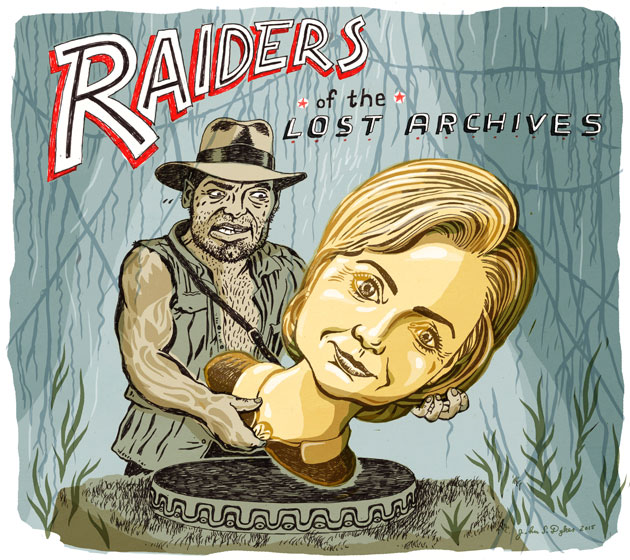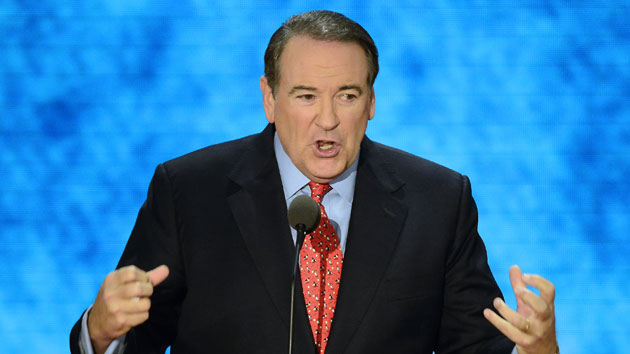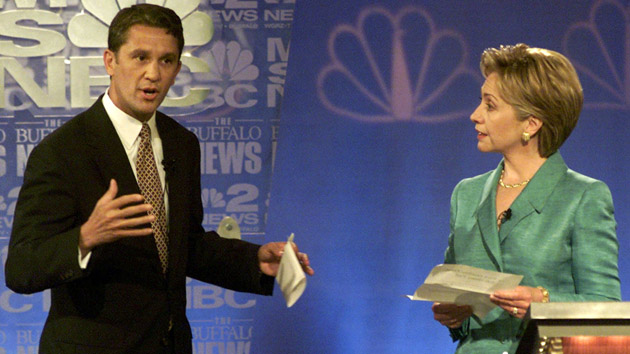
I met Larry Nichols, the self-described smut king of Arkansas, at a breakfast joint in Conway, not far from the spot where he claims Bill Clinton loyalists once fired on him and a reporter for London’s Sunday Telegraph. “You have to understand,” he said, looking up from his coffee, “you’re in Redneck City.” Nichols had declared war on the Clintons in 1988, when Bill was governor, after being canned from his job at a state agency for placing dozens of long-distance phone calls on behalf of the Nicaraguan Contras. As he hunched over the table in four layers of winter clothing, Nichols indulged in the caginess that had once seduced a small army of conservative journalists seeking dirt on the Clintons—the lurching, twangy, conspiratorial tones of someone with a secret he wasn’t sure how to spill. For a moment, I felt as if I’d taken the wrong exit off I-40 and ended up in 1995.
But Nichols, who did as much as anyone in Arkansas to paint an image of the 42nd president as a womanizing, cocaine-snorting, dirty-dealing, drug-running mafioso, was ready to move on. “There is nothing you’re gonna find here,” he told me. “Pack your shit and go home. Good God, man—that was 20 years ago.”
With Hillary Clinton the odds-on favorite in next year’s Democratic presidential primary, all that was past is suddenly new again. The reinvestigation of the Clintons was already well underway by January, when Republican National Committee chairman Reince Priebus boasted to Bloomberg that he had dispatched a team of operatives to Little Rock to investigate the former first lady and secretary of state. “We’re not going to be shy about what we are doing,” he said. “We’re going to be active. We’re going to get whatever we have to in order to share with the American people the truth about Hillary and Bill Clinton.” Last year, America Rising, an opposition research firm/political action group that works with Republican candidates, placed a full-time researcher in Little Rock, where she pored over newly declassified documents at the Clinton Presidential Library.
But 20 years after the so-called Arkansas Project, the multimillion-dollar campaign financed by conservative billionaire Richard Mellon Scaife that turned Whitewater and Troopergate into household names, opposition researchers face a conundrum: Considering that the first expedition for dirt on the Clintons culminated in impeachment proceedings, are there any stones left unturned in Little Rock?
Few pieces of political turf have been excavated as thoroughly as Arkansas was in the 1990s, when conservatives scoured the Ozarks for evidence of everything from plastic surgery (to fix Bill’s supposedly cocaine-ravaged nose) to murder (a list of suspicious deaths, promoted by Nichols, became known as “Arkancides”) and, of course, womanizing. In the state capital, the return of the oppo researchers has been met with a sigh. “Bill and Hillary left here in December of 1992 and never came back,” said Max Brantley, a longtime political columnist at the Arkansas Times. “Kenneth Starr ran everything through that grand jury. There may be something, but I can’t imagine what.” Rex Nelson, a former aide to Republican Gov. Mike Huckabee, told me there was nothing left to unearth about the Clintons, “unless there’s ancient relics buried in the dirt under the Rose Law Firm,” where Hillary was once a partner.
In their quest for fresh muck, the diggers have fixated on a new chamber of secrets: archives. With a 40-year record to pore over, oppo researchers and journalists have been gifted an almost unprecedented trove of papers from former Clinton associates, and tens of millions of pages from the couple’s years in Arkansas and Washington, DC, some of which have only recently been made public. “Every chief of staff, every top official for any Clinton office dating back 40 years has donated their papers to a university,” said Tim Miller, a cofounder of America Rising. “We’ve gone to other libraries where staffers from the Clinton White House, or Clinton governor’s office, have donated papers, or authors have written profiles on the Clintons.” (Shortly after I spoke with him, Miller took a job with Jeb Bush’s campaign. Throw in material related to Bush, a former governor and kin to two presidents, and next November’s race might feature the longest collective paper trail in history.)
Last year, the Washington Free Beacon, a conservative news outlet that wears its animus toward the Clintons as a badge of honor, hired an oppo researcher to help dig through special collections at the University of Arkansas in Fayetteville. It came away with a series of journal excerpts from longtime Hillary confidante Diane Blair in which the first lady was quoted as calling Monica Lewinsky a “narcissistic loony toon.” The story made national news. “When those stories hit, we got busy for a week or so,” said Geoffrey Stark, the reading room supervisor at the university library’s special collections. The quiet basement room, with its oil paintings of homegrown artists and politicians looking on in judgment, filled up with reporters hungry for whatever scraps were left behind.
The Republican intelligence gathering has also spawned Democratic counterintelligence operations. Leaving nothing to chance, Correct the Record, a pro-Hillary group fronted by David Brock, the former right-wing journalist turned Clinton loyalist, dispatched a staffer to Fayetteville to scan the archives. Twenty-one years after he had blown open Troopergate, the bombshell that purported to detail how Bubba’s security detail facilitated his sexual liaisons, Brock was returning to Arkansas to put the genie back in the bottle. Correct the Record spokeswoman Adrienne Elrod confirmed that the group has been visiting the archives, but said, “We aren’t getting into the specifics of tactics or strategies.”
Yet even the field marshals of the new invasion recognize that the Clintons have moved on to bigger things. Miller expects the Arkansas cache to be used more as supporting evidence rather than the main indictment. The Whitewater scandal of 2016 won’t be set in Arkansas; given Republicans’ fixation on the family’s international nonprofit, the Clinton Foundation, it might not even be in the United States. “For me, the big difference between 2016 and 2008, from a research standpoint, is that their network of influence has grown exponentially,” Miller explained. “When you’re talking about crony capitalism and special deals in the ’90s, a lot of times the beneficiaries are, like, Arkansas lawyers. Now their influences are the global elites.” And what’s not in the Clintons’ archives may turn out to be just as damaging, as Hillary found out in March, when it was revealed that she had skirted public recordkeeping requirements by conducting all of her State Department business with a private email address.
The Arkansas the Clintons left behind isn’t just old news—it hardly exists anymore. One morning in February, using the Whitewater report as my Lonely Planet guide, I spent a few hours walking through a Little Rock neighborhood known as SoMa, searching for remnants of the real estate deals that compelled special investigator Kenneth Starr to set up shop in town. In testimony, the area was described as “a slum district,” but it has since flowered into a yuppie paradise. I got a blank stare when I mentioned Whitewater at the farm-to-table café across the street from the former headquarters of Madison Guaranty Savings and Loan, the bank wrapped up in the Clintons’ scheme to turn a patch of land on the White River in the Ozarks into a summer resort. The young employee behind the counter seemed to think I was asking about whitewater rafting.
Now, in a salute to history, a subpoena-serving firm occupies the office that the state government once leased from the Clintons’ Whitewater banker pal. Next door at the Esse Purse Museum, I’d missed a special exhibit called “Handbags for Hillary,” a joint installation with the Clinton Library of pocketbooks given to the first lady (including one made out of socks, in honor of the family cat). The closest I came to scandal was at the Green Corner Store, purveyors of artisanal ice cream that, I was told, is whipped up in the very building “where Bill met Jessica Flowers.” (Bill’s alleged paramour was in fact named Gennifer.) The soda jerk who poured my small-batch lavenderade hinted that Hillary faces a more immediate challenge from another woman: She’s torn between Clinton and Massachusetts Sen. Elizabeth Warren.
If the conspiracy-slinging Clinton antagonists are a bit quieter this time around, that’s also because—cue the ominous voice-over and shaky-cam footage—many of the loudest ones are now dead. John Brown, a sheriff’s deputy who alleged that the Clintons had murdered several Arkansans over a cocaine-trafficking operation, died in prison. Jim Johnson, the segregationist former Arkansas Supreme Court justice who lent a semblance of gravitas to the 1994 conspiracy flick The Clinton Chronicles, committed suicide five years ago. The Reverend Jerry Falwell, who sold 60,000 copies of the film, died in 2007. Parker Dozhier, the trapper and bait shop owner whom Scaife paid to find dirt on the Clintons, is, like his benefactor, dead.
Others have gotten out of the game. David Brock broke bad. Ambrose Evans-Pritchard, the Sunday Telegraph scribe who reported in a gossip- and conspiracy-laden book that Bill liked to dance around in a black dress after doing cocaine with his brother, went back to Europe. “I think Hillary was a good secretary of state,” he said in an email, although he stands by his earlier work. (He doesn’t recall being shot at with Nichols.) When I reached Larry Patterson, the retired state policeman whose grudge against Bill over a forgotten transfer compelled him to talk to Brock for the Troopergate story, he was curt. “Sir, the Clintons have taught me a lesson,” he said. And then he hung up.
Of the original band of Clinton hunters, only Nichols kept up the ruse, doing interviews with fringe right-wing radio hosts, even boasting in 2013 that he had been Bill’s personal hit man, which he now says he didn’t mean and wouldn’t have said if he hadn’t been on painkillers.
But something strange has come over him. After six years of watching Barack Hussein Obama cower in the face of Islamists, Nichols believes the family he spent two decades tarring as cold-blooded crooks might just be the only people who can save the country. “I’m not saying I like Hillary, you hear me?” he said, defensively. “I am not saying I like Hillary Rodham Clinton. I’m not saying anything I’ve said I take back. But God help me, I’m going to have to stand up and tell conservative patriots we have no choice but to give Hillary her shot.”
“I know she won’t flinch,” he continued. “That’s a mean sonofabitch woman that can be laying over four people and say”—he paraphrased her now-infamous response to hostile congressional questioning on the deaths of four Americans in Libya—”‘What the hell difference did it make?'” He was against Clinton because of Whitewater. Now he’s voting for her because of Benghazi.
















